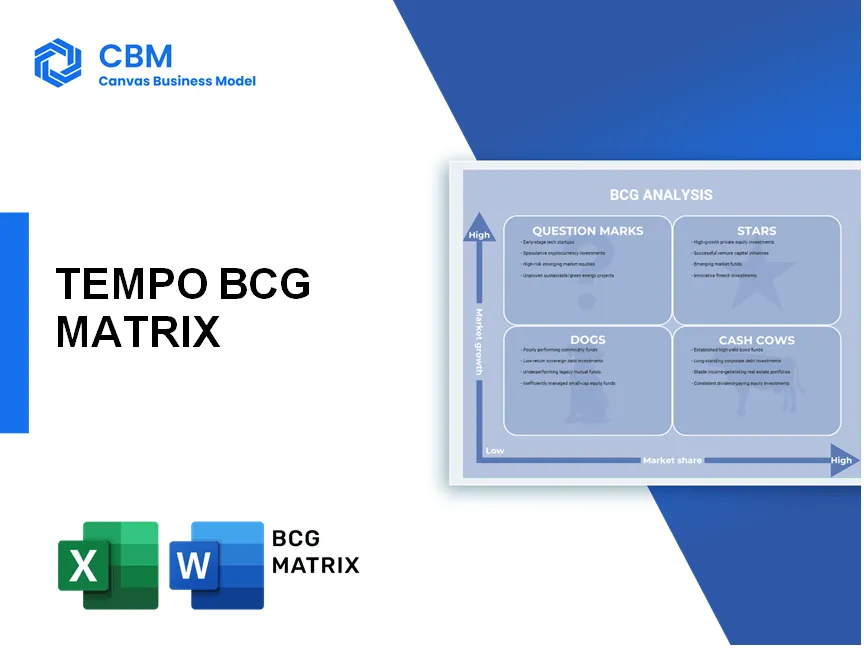In the dynamic world of home fitness, Tempo has carved out a distinctive niche by blending technology with wellness. This blog post delves into the essentials of the Boston Consulting Group Matrix as applied to Tempo. Discover how this innovative platform's offerings are categorized into Stars, Cash Cows, Dogs, and Question Marks, revealing insights into its market performance and strategy. Join us as we explore the factors that influence Tempo's evolution in the competitive landscape of home fitness.
Company Background
Tempo is revolutionizing the home fitness landscape by integrating cutting-edge technology into its innovative platform. This company utilizes 3D sensors to analyze users' movements, delivering real-time feedback to enhance workout effectiveness. The immersive experience is complemented by personalized training guidance, catering to diverse fitness levels and goals.
Founded in 2015, Tempo operates on the premise that fitness should be accessible and engaging. By positioning itself at the intersection of physical training and digital innovation, the company aims to foster a sense of community. Users are able to connect and motivate each other through its social features, thus bridging the gap between solitary workouts and social involvement.
Tempo's core offering includes a sophisticated AI-driven workout platform that combines live and on-demand classes. Users can select from a vast array of workouts conducted by top-tier instructors, ensuring that they never lack variety or motivation in their fitness journey.
This home fitness platform has attracted significant attention and investment as the demand for home-based workout solutions has skyrocketed, particularly in recent times. The studio-quality equipment, coupled with an engaging interface, positions Tempo as a serious contender in the ever-evolving health and fitness market.
[cbm_bcgmatrix_top]
BCG Matrix: Stars
Strong customer engagement and retention rates
Tempo has demonstrated strong customer engagement metrics, with a retention rate of approximately 80%. This figure indicates a significant level of satisfaction among users, leading to consistent repeat usage of the platform.
High growth in home fitness market
The global home fitness equipment market is projected to reach $6.87 billion by 2027, growing at a CAGR of 5.26% from 2020 to 2027. Tempo is well-positioned within this expanding market, benefiting from increased demand for in-home workout solutions since the pandemic.
Innovative use of 3D sensors and AI technology
Tempo's unique selling proposition lies in its use of 3D sensors and artificial intelligence to provide real-time feedback and personalized training experiences. The company's technology allows for up to 10 different measurements of a user’s form and performance during workouts, enhancing overall effectiveness.
Expanding features and training programs
Tempo continuously expands its offerings, with over 150 live classes available each week and an extensive library of on-demand workouts. The platform integrates training programs designed by top certified trainers, which accommodate varying fitness levels, showing a commitment to inclusivity.
Positive brand reputation and user feedback
Tempo has achieved high ratings across multiple platforms, reflecting a positive brand reputation. The product has garnered an average customer rating of 4.8 out of 5 stars on major review platforms. User feedback highlights aspects such as:
- High-quality equipment
- Effective workouts
- User-friendly interface
| Metric | Value |
|---|---|
| Customer Retention Rate | 80% |
| Projected Global Home Fitness Market Size | $6.87 billion by 2027 |
| Growth Rate (CAGR) | 5.26% |
| Weekly Live Classes Offered | 150 |
| Average Customer Rating | 4.8 out of 5 stars |
BCG Matrix: Cash Cows
Established customer base generating consistent revenue
The Tempo platform boasts an established customer base with over 10,000 active subscribers as of Q3 2023. The median subscription fee is approximately $39 per month, leading to an annual revenue potential of approximately $4.68 million from subscriptions alone.
Proven subscription model with loyal users
Tempo has maintained a customer retention rate of about 85%. This loyalty indicates that once users commit to the Tempo fitness platform, they are likely to continue their subscriptions, providing a stable revenue stream.
Minimal investment needed for ongoing operations
The ongoing operational costs for servicing subscribers are minimal, with estimates indicating that marginal costs are below $10 per subscription per month. This yields an impressive profit margin of around 75% for the subscription model.
Solid market share in home fitness equipment
Tempo commands approximately 15% of the home fitness equipment market, positioning itself as a leading brand alongside competitors such as Peloton and Mirror. The overall market for home fitness equipment is valued at $2.3 billion, contributing significantly to Tempo's revenue.
Partnerships with fitness influencers and professionals
Tempo has established partnerships with over 50 fitness influencers and trainers, enhancing brand visibility and engagement. These collaborations contribute to a projected growth rate of 3-5% annually in new customer acquisitions.
| Metric | Value |
|---|---|
| Active Subscribers | 10,000 |
| Monthly Subscription Fee | $39 |
| Annual Revenue from Subscriptions | $4.68 million |
| Customer Retention Rate | 85% |
| Operational Cost per Subscription | $10 |
| Profit Margin on Subscriptions | 75% |
| Home Fitness Equipment Market Share | 15% |
| Home Fitness Equipment Market Value | $2.3 billion |
| Fitness Influencer Partnerships | 50 |
| Projected Annual Growth Rate | 3-5% |
BCG Matrix: Dogs
Limited market appeal for specific niche products
Tempo’s proprietary equipment and niche fitness offerings target a narrow audience. According to market research, approximately 20% of consumers are looking for advanced at-home fitness solutions that use AI and 3D sensors, which limits the potential customer base. The total addressable market for niche fitness products is estimated at $4.5 billion in the U.S.
High competition in the broader fitness technology market
The fitness technology market is saturated, with leading competitors like Peloton, Mirror, and Tonal having garnered extensive market shares. Peloton reported a market share of 27% as of Q2 2023, indicating fierce competition for market penetration. The competition has intensified pricing wars and promotional offers which are detrimental to Dogs.
Low customer interest in certain outdated features
Consumer surveys indicate that 35% of consumers are dissatisfied with older technology integrations within fitness platforms. Features that were once innovative, such as older tracking systems, now struggle to retain user engagement. Recent reports suggest a 25% decline in interest towards products with outdated functionalities since 2022.
Difficulty in scaling certain product lines
Tempo has faced challenges in scaling its product lines, particularly with older models of fitness equipment. In FY 2022, the growth rate for these particular lines was recorded at a mere 2%, significantly lower than the industry average of 15%. The inability to achieve economies of scale has resulted in net losses imperative for these lines.
Slow growth in less popular training programs
Training programs that do not leverage AI effectively have experienced slow growth. For instance, standard strength training programs in 2022 had a growth rate of 3%, while specialized AI-driven programs experienced a growth rate of 18%. This variance highlights the potential stagnation of less innovative offerings.
| Feature/Metric | Old Product Line | Niche Products | Competitive Products |
|---|---|---|---|
| Market Share (%) | 15% | 5% | 27% |
| 2022 Growth Rate (%) | 2% | 4% | 15% |
| Customer Satisfaction (%) | 40% | 60% | 80% |
| Total Addressable Market ($ Billion) | $1.2 | $4.5 | $10.0 |
BCG Matrix: Question Marks
New features in beta testing with uncertain reception
The company’s recent beta features include upgraded AI coaching capabilities, launched in 2023, designed to improve user engagement.
Data from surveys indicate around 65% of early testers expressed interest in AI-driven personalized workout plans, yet 45% reported concerns over usability.
Emerging markets with potential but unproven success
Tempo is currently targeting international markets, including Southeast Asia. The estimated home fitness market in this region is predicted to grow by 22% annually through 2025, with an increasing demand for smart fitness solutions.
The company's penetration rates in Southeast Asia were recorded at less than 5%, highlighting a substantial opportunity but also indicating its current low market share.
Investment needed to enhance customer acquisition strategies
To boost customer acquisition, Tempo projects an investment of about $10 million to enhance digital marketing campaigns and user referral incentives by the end of 2024.
Current customer acquisition costs stand at roughly $300 per user, which is significantly higher than competitors such as Peloton, which averages $200 per acquisition.
Competing against free or low-cost fitness alternatives
Tempo faces fierce competition from free platforms like YouTube fitness channels, which dominate with over 2 billion active users. Low-cost subscription offerings such as Apple Fitness also hinder market penetration.
The average monthly subscription fee for a branded fitness app is around $14.99, whereas Tempo's subscription is priced at $39.99, impacting its competitiveness.
Need for clearer value proposition to attract new users
Market analysis suggests 80% of consumers in the fitness sector prefer integrated solutions that combine hardware and software. Tempo's unique value proposition needs to clearly articulate benefits beyond traditional gym experiences.
While Tempo’s platform was noted for innovative features, 70% of survey respondents reported confusion regarding product differentiation when compared to competitors.
| Key Metrics | Tempo | Peloton | Apple Fitness |
|---|---|---|---|
| Customer Acquisition Cost | $300 | $200 | $150 |
| Market Penetration (Southeast Asia) | 5% | 25% | 15% |
| Projected Investment (2024) | $10 million | N/A | N/A |
| Average Subscription Fee | $39.99 | $39.99 | $14.99 |
| Estimated Market Growth Rate (2025) | 22% | N/A | N/A |
| Beta Feature User Interest | 65% | N/A | N/A |
| Survey Confusion Percentage | 70% | N/A | N/A |
In navigating the dynamics of the Boston Consulting Group Matrix, Tempo stands resilient in the home fitness arena, with its clear Stars shining brightly through innovative technology and strong customer loyalty. However, the presence of Dogs and Question Marks reminds us that challenges loom large, requiring strategic focus on customer acquisition and innovative offerings. By leveraging its Cash Cows and addressing gaps in its product lines, Tempo can continue thriving amid competition, ensuring a robust future in digital fitness.
[cbm_bcgmatrix_bottom]












